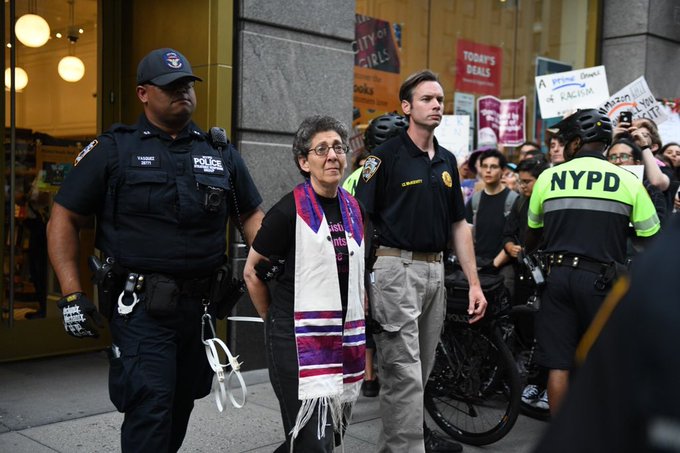
Why We Protested Amazon on Tisha B’Av
I was in the bookstore that day as part of the advance team for a protest that I helped to organize. My job was to play the part of patron until the crowd of almost 1,000 Jews arrived at the store. As my fellow activists filed in, I took up a position in between bookshelves, where I watched about 40 people dressed in black make their way to the center of the store and sit down. Among them were 11 of my rabbinic colleagues. In front of a huge banner with the words Never Again Means Never Again, a voice boomed, “We are here to observe a ritual on Tisha B’Av, a Jewish day of mourning.”
The event had started several hours earlier at Congregation Beit Simchat Torah (CBST), where hundreds of Jews had gathered as one of almost 60 such events around the country that day. My organization, T’ruah: The Rabbinic Call for Human Rights, in partnership with several other national organizations, had encouraged Jewish communities to hold #CloseTheCamps events, an initiative of United We Dream. We wanted to bring attention to the fact that the atrocities on our southern border are actually happening all across the country. And we wanted Jewish communities to demonstrate this solidarity with immigrants, refugees, and asylum seekers on Tisha B’Av, a Jewish day of mourning. As we remembered the catastrophes that have befallen the Jewish people, we pointed to the current catastrophe of immigration policy unfolding before us.
At CBST we prepared for the action with Torah and with training. Rabbi Shai Held taught us that the Torah’s ethical revolution was to insist that being a part of a community means caring for not just our vulnerable but the vulnerable. The tables were overflowing with oak tag and markers as kids and adults alike made their own signs. And our allies at Mijente shared their ongoing campaign against the technology companies playing an increasingly central role in facilitating the expansion and acceleration of arrests, detentions, and deportations. ICE is only able to develop and operate its massive information systems, they explained, with the technology industry and its products and services, like those of Palantir (which just renewed its contract with ICE for a reported $49 million) and Amazon Web Services.
And so we went to Amazon to perform in public our Tisha B’Av ritual, calling out the atrocities that the company enables, and giving the store the option of losing business for several hours or ending the ritual by arresting the people doing it.
In between verses from the book of Eicha — the poetic lament for all Jewish catastrophes — rabbis read testimonies from people held in the inhumane conditions of detention centers. One got choked up as she read an account from a child in Texas: “I’m hungry here at Clint all the time. I sometimes wake up in the middle of the night with hunger.”
As the crowd chanted a periodic rejoinder from Eicha, “My tears fall without cease!”, the New York Police Department gave its final warning, and only those seated were left sitting in a circle on the floor, a lone protest sign on a table nearby the only remaining evidence of the crowd: Amazon Causes FAMILY SEPARATION.

Photo Credit: Gili Getz
I made my way outside to a crowd of hundreds singing and chanting. I walked down the sidewalk to the end of the lines of people and started crying, feeling overwhelmed by the power of the action as I watched 44 people escorted out of the store in handcuffs and into a city bus requisitioned by the police.
A month before I had spoken at an event outside the Palantir offices in the meatpacking district, to a crowd of about 50. Years ago I read IBM and the Holocaust: The Strategic Alliance Between Nazi Germany and America’s Most Powerful Corporation, and I brought the book’s main idea to that short speech: “What if 80 years ago IBM had said ‘no’ to the German government?,” I asked. “What if they had refused to provide pivotal help in the form of technology — using census data and punch cards — that allowed the Nazis to identify, isolate, and imprison the country’s Jewish population?”
The #NoTech4ICE movement is growing, and when they write the book on the role that technology companies played in this moment in history, Palantir and Amazon won’t fare well. But I hope there will be a chapter on what Jewish communities did to say, “Never Again is Now.”



